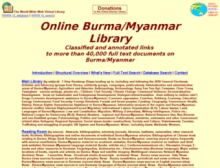Resource information
Executive Summary: "Burma is rich in natural resources, particularly natural gas and oil. Yet instead of using these resources for the country’s development through industry and job growth, military leaders have been exporting them for over a decade. This has generated huge revenue flows, but a lack of transparency and mismanagement of these revenues has left Burma with some of the worse development indicators in the world, creating a resource curse. Sales revenues of natural gas exports alone amounted to US$ 2.5 billion in 2010-11. It is estimated that this amount will increase by over 60% to US$ 4.1 billion starting from 2013 as three additional production blocks come on line. Further revenues will be generated from over 40 additional oil and gas blocks that are currently under exploration. Despite this enormous wealth, Burma remains extremely poor and its people live with chronic energy shortages. It is a country crippled by corruption, with its major businesses controlled by military companies and cronies. Burma is censured for major human rights violations, and continues to suffer from a decades-old civil war between the ruling government and ethnic peoples. Due to Burma’s lack of protection laws, projects which extract and export natural resources have directly led to human rights abuses such as forced labor, land confiscation, rape and displacement, as well as severe environmental degradation. The projects also fuel armed conflict as government and ethnic troops clash in order to access and control project areas. The revenues from resource extraction projects have in turn helped prop up authoritarian rule and enrich top military generals. The report analyzes the previous Than Shwe regime and new military-dominated government’s lack of transparency around oil and gas revenues, lack of an accountable system to manage revenue, corruption, and a lack of equitable benefit sharing of resource revenues. Although a new “civilian” government is now in place, under Burma’s new constitution, the military remains firmly outside the law and beyond civilian control. The role of military companies in Burma’s economy and in accessing and managing Burma’s massive oil and gas revenues remain unknown and unregulated. The government does not disclose how much it receives in gas revenues, or how those revenues are managed or spent. Foreign oil companies engaging in Burma’s oil and gas sector also refuse to publish how much and how they pay the military regime. There is therefore an urgent need for Burma to manage oil and gas revenues with greater transparency and accountability as well as to reform its military-dominated economy to ensure that the benefits of the country’s resources are shared more equitably among its people and for the country’s sustainable development. If Burma prioritizes the protection of peoples and the environment in extraction projects and manages the revenues from the sale of its resources transparently, the country’s non-renewable resources can be used sustainably for the benefit of current and future generations, decreasing the pace and need to extract resources from additional areas. Mechanisms and systems for public disclosure of money flows, independent revenue management and auditing, civil society input, and equal benefit sharing currently exist in international standards of revenue transparency and are put into practice in oil and gas producing countries around the world. This report provides key lessons from these countries that Burma can draw on to improve the management of its oil and gas revenues and work toward ending its resource curse.



